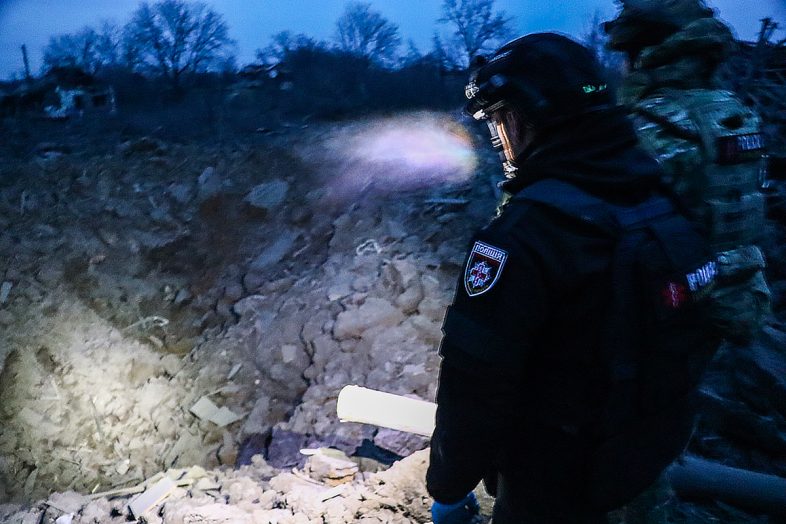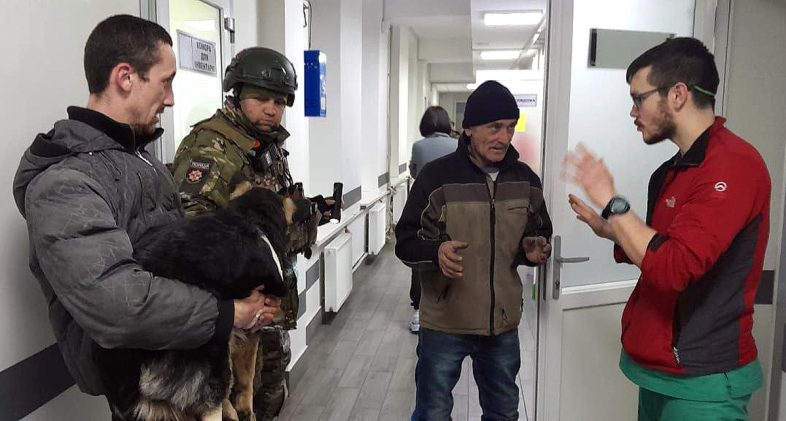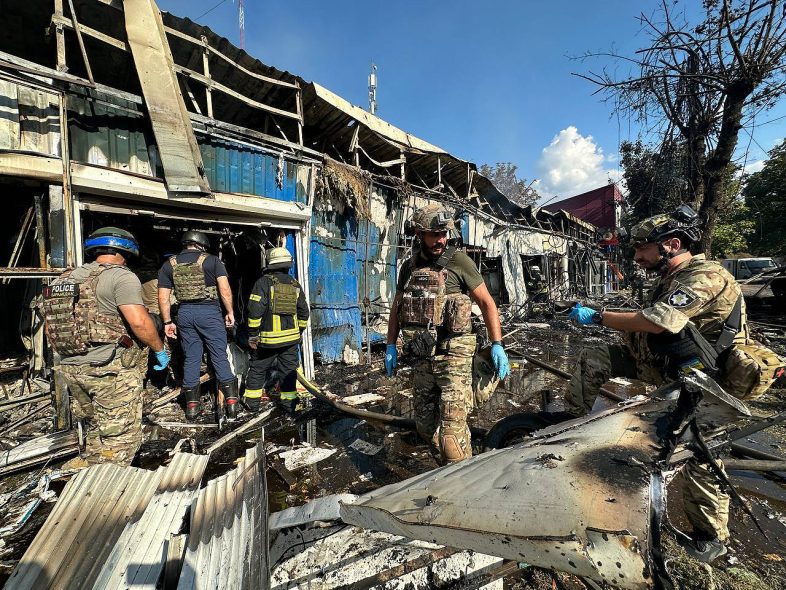This time, the call disrupted the stillness of the night. While Pokrovsk lay dormant, the enemy unleashed a barrage of S-300 missiles on the city. Swiftly, another team of paramedics and police officers responded, racing towards the scene. Initially guided by the echoes of destruction, they were watching the distant glow of burning structures. Then, fresh updates from vigilant dispatchers were delivered.
“As we were driving, we could still hear the explosions,” recalls Ruslan Hubanov, a senior police lieutenant. “We knew there was a direct hit on a private residence. That meant there could have been people trapped under the rubble”. At a scene, a woman met our group. “She was screaming, in a state of panic,” the police officer recalls. “She said her relatives were caught in the shelling, and the house collapsed on them. I rushed into the yard; everything was covered in dirt and set on fire; you could see absolutely nothing around. I heard a child crying but couldn’t figure out where they were. Chaos engulfed everything. I finally managed to locate where the cries were coming from and immediately rushed towards it”.
Amidst the wreckage of the house, the police officer discovered a father cradling a baby in his arms. The man was hunched over, and the child was also covered in blood. The rescuer helped the man navigate through the debris, then gently took the child from his arms and began wiping away the dirt. “I needed to see if it was her blood and her injuries.” Having found no apparent wounds on the child’s body, Ruslan wrapped her in his jacket and quickly transported her to the hospital, where medical professionals promptly conducted thorough examinations and X-rays. “It was all very coordinated and fast,” recalls the police officer. “Fortunately, the baby was healthy, with only a minor bruise on the head. She was very lucky.”

Photo: Ukraine’s National Police
While Ruslan was rescuing the baby, his colleagues, along with the Emergency Service workers who had also arrived at the scene of the tragedy, were attempting to assist other family members. Before offering aid, however, they had to locate them among the rubble. Oleksandr Savenko, the Head of the police paramedics in Donetsk, recalls seeing a bloodied father near the entrance of the house, passing him to his colleagues, and going inside to search for the lady of the house. “When I entered,” says Oleksandr, “I saw two Emergency Service workers trying to pull a woman from underneath the rubble. Her leg was trapped. I asked whether they needed any help, perhaps some pain relief to make it easier, but they said they could handle it.” After some time, they did manage to get the woman out. The couple’s elder son, 13 years old, with a minor injury, was also found. People were promptly placed in the ambulance and taken to the hospital in Pokrovsk.
“Later, as I was still surveying the area, I saw a crater about 5-7 meters deep near the house, most likely caused by the S-300”, recalls the paramedic. “Well, by now, we’ve already learnt to tell whether it’s from the S-300 or the Iskander. It was a very powerful explosion. This family was truly saved by their guardian angel this time.”
That same evening, after a medical examination, rescuers brought in the mother with two children to their relatives. They were almost unharmed, having only experienced severe stress. The father remained in the hospital; he sustained several facial injuries and required medical assistance. “When I saw Ruslan’s video [the video from the rescuer’s chest camera – ed.],” says Oleksandr Savenko, “I noticed that the baby hadn’t shed a single tear while in his arms. I have three children, and I know how babies cry, especially in the arms of a stranger. The child must have been deeply frightened”.
Later, on St. Nicholas Day, the police officers visited the family, bringing treats and diapers for the children. They conduct such visits whenever an opportunity arises, hoping to maintain connections with those they’ve rescued, inquiring about their future, and providing assistance—extending their care beyond just people.
One night in the spring of 2023, Russian occupiers shelled the town of Kostiantynivka. A group of paramedics, led by their supervisor, responded to a call to rescue made by an injured elderly woman. Upon arrival, it turned out that the woman was just frightened; her blood pressure had soared, but she had no injuries.
They were about to return to the base when suddenly a neighbour, a boy who had helped the paramedics reach the elderly woman, asked the rescuers to help his dog. “It turned out that during the shelling, his German Shepherd puppy was injured,” recalls Oleksandr.”We sat in the armoured vehicle because it was very dangerous there, and I tried providing first aid to the poor animal in the car; I was using a flashlight. The puppy had shrapnel wounds on its back and paws.” After an initial aid, they took the dog to the hospital. The young duty officer was taken aback when he saw such an unusual patient and unsuccessfully tried to dissuade the paramedics from the idea of treating a dog in a human hospital. He had to give in eventually. “We insisted on helping the animal,” says Oleksandr.

Photo: Ukraine’s National Police
“I bandaged its wounds, but it needed stitching.” After the operation, they took the puppy home with its owner. “Later, I spoke to the boy on the phone. He said that the puppy used to get scared during every shelling, but he got over it. It’s been almost a year now; he is a big boy now. When I return to Kostiantynivka, I want to see how this dog is doing. I adore animals. Once, even before the training centre, I worked in the State Guard as a dog handler and brought a German Shepherd puppy home with me.”
Most of the Captain Oleksandr’s team is from Mariupol. There, they worked as instructors at the Training Center of the National Police in Donetsk Oblast. After the full-scale Russian invasion, when Mariupol faced the threat of full encirclement, the Training Center team was ordered to relocate to Pokrovsk. On March 7, 2022, Captain Savenko was summoned by the head and given the order to create groups of paramedics who would respond during shelling jointly with the Emergency Service and ambulances, providing assistance and rescuing people. Captain Oleksandr Savenko himself was appointed as the head of the paramedics.
The challenge was that civilian doctors and employees of other services often refused to respond to calls after shelling, fearing they might fall victim to repeated shelling or encounter unexploded shells. Still, someone needed to save people, and the police took upon this mission.
“Once, after the daily briefing,” recalls Oleksandr, “we received the first report that an employee of Ukrzaliznytsia [Ukrainian Railways – ed.] had been injured at the railway station. The day before, Russians shelled Pokrovsk with Smerch cluster munitions, and apparently, some unexploded ordnance remained. The railway employee attempted to push the shell away and suffered injuries from the subsequent explosion. When we arrived at the scene, we saw an ambulance, but the doctors were hesitant to approach the scene.” Police officers, who were now also paramedics, approached the injured man – he had a partial leg amputation; paramedics applied a tourniquet, immobilised him with a splint, placed him on a stretcher and carried him about five hundred meters along the railway to a paramedic who administered pain relief. The man was then transported to the hospital. “I remember he was conscious,” says Captain Savenko, “and probably was deeply religious because he begged us not to give him a blood transfusion, no matter what would happen to him. He was in a lot of pain.” Unfortunately, at the hospital, the man also refused a transfusion (which was essential for his recovery), and he passed away by morning. Later, when explosive ordnance disposal experts arrived at the tragedy site, they recorded another unexploded shell. “Essentially, by providing assistance,” says Oleksandr, “we were exposing ourselves to an imminent danger; we could also get injured or die. Nonetheless, our goal is to save people”.
“We always arrive first,” says Ruslan Hubanov, “us, first, everywhere. Then, the ambulance, emergency service, and investigative operational groups come to document crimes; other teams later follow. But our paramedic team is the first to respond everywhere: to every shooting, every enemy attack, every explosion. At any time of day. We work in shifts around the clock.” Of course, this job is very dangerous. Paramedics are well aware of it. After all, a building damaged by an explosion can collapse at any moment, there may be unexploded ordnance at the scene, and finally, Russians may intentionally shell the same place again to cause more casualties.
“At this moment, every minute counts,” says Ruslan Hubanov, “and there’s no time to waste. A person dies from bleeding out in three minutes and from the lack of oxygen – in five. These minutes are priceless; these seconds hold immense significance to us. We always respond, day and night. We don’t have such a thing as a day off. Once we receive information from the duty unit about an incident, we drive there straight away. At the outset, it’s uncertain if there are casualties, but we certainly don’t want them, and we cannot afford to squander time.”

Photo: Ukraine’s National Police
“I’ll tell you about the latest incident when Russians shelled the city of Pokrovsk and the Pokrovsky district,” says Oleksandr. “It was on January 6, Saturday, around 3 PM”. The team arrived at the scene and found a mother and son with their faces covered in blood, unable to see anything. It was a bloodbath; even after we used a hemostatic agent, the blood wouldn’t stop”, says Oleksandr. The injured were quickly sent to the hospital, and the rescue team went to search for others who might be wounded. “As we walked, we heard a loud hissing,” recalls the paramedic, “it was coming from a broken pipe under high pressure; like gas escaping a turbine. One spark, and we would have been blown up. But we knew there were people there who needed help. We found an elderly woman standing near her destroyed house in a state of shock and horror.
“Then and there, we found this man – his face was wounded. From his own words, we learned that his home was there; his wife and their two children were inside at the time of the strike. We came closer – nothing was left of it but a massive crater from a Russian shell. It was nearly five meters deep. I realised that at that moment he already knew that his family was killed; they perished in a Russian strike. I could see that he didn’t want to live anymore because they were gone”.
Oleksandr says that in such cases, paramedics try to support people, providing them with some psychological help. Sometimes it’s very challenging. Incidents where children are hit during shelling are especially hard to bear, and unfortunately, those are not uncommon. There are injured and dead children. “And you know, this is our biggest fear,” confesses the head of the paramedics, “it’s that we won’t be able to help the little ones”.
Unfortunately, there are hundreds of such stories, often intertwining with one another. While serving as paramedics in Donetsk, they’ve undertaken over 2,000 combat deployments, rescuing 735 individuals. Not every mission involves administering first aid; sometimes, it’s merely to document shelling. However, each day brings a new set of challenges. There can be five to eight deployments in a single day. In Kostyantynivka, there were once 15 deployments in one day because the ambulance didn’t respond, and the calls were redirected to the paramedics. “They transported the wounded to the hospital, then went out again, and came back again, and again. They only had time to replenish their medical supplies before heading to the next shelling. Every hour, every two hours”.
To enhance effectiveness, the team consistently strives for improvement. They undergo advanced courses and participate in various training sessions. “Various international organisations, including the volunteers, are very helpful in this,” says the head of the police paramedics.”We have taken numerous courses; our guys have travelled abroad for training. Ultimately, each of us has gained experience. It has never happened that anyone from my team didn’t know how to behave in a specific situation. We follow the MARCH algorithm and know how to provide assistance to people”, Oleksandr explains. “Sometimes, when foreigners come,” he adds, “they say, “Guys, we’re not sure why you’re still being taught; you are the ones who can teach us”. And I know that after the victory, my guys, my teammates, we will go and teach in the European Union, sharing our experience.”
Once, the team was working in Kostiantynivka at the shelled site, fortunately without casualties. Suddenly, a terrible explosion shook the air, and then, through their radios, they were informed that the city centre had been targeted. “It was around noon, the peak time,” recalls Ruslan. “A Russian rocket hit the central market, where there was a large gathering of people.” The brigade immediately rushed to provide assistance.
“When we arrived, we saw cars and shops on fire. People were running in despair, crying, and there were many wounded and killed. It was a gruesome sight. We saw people bleeding,” recalls the paramedic. “We rushed to help”. When his colleague’s car was full of wounded, they went to the hospital, and Ruslan continued further. Then, the State Emergency Service and another group of paramedics arrived. Civilians started to gather around, helping and supporting each other and providing assistance. Later, when the fire was extinguished, we retrieved people who had died in the stores. Regrettably, I don’t recall the precise number, but there were a significant number of injured and dead at that time.
Paramedics say that Russians deliberately target civilians. “Because Russia is a terrorist country,” they explain. “Because they want to kill as many as they can; they shoot at civilians to intimidate them”. To reduce mortality in such instances, paramedics routinely organise first aid training sessions for civilians. “We want people to know how to provide first aid if needed so they can help each other until we arrive”.
At the moment, there are 10 groups of police paramedics operating in the Donetsk region. They are present in each territorial unit. Additionally, there are five White Angel units (also police). They are tasked with evacuating from frontline areas and operating in various hotspots, including Avdiivka, Mariupol, Lyman, Velykonovosilky, and Bakhmut. Drawing from the Donetsk police experience, similar units have been established in other regions where combat actions occur, including in the Zaporizhzhia and Kherson regions.
Throughout the war, four paramedics from Oleksandr Savenko’s team sustained injuries, all of which transpired during a single mission. Upon receiving information about the shelling of a residential building in the centre of Pokrovsk, the team promptly rushed to the scene to rescue people. While the rescue operation was already underway, Russians targeted a neighbouring building, shelling the city again. Paramedics were loading the wounded into the vehicle for transportation to the hospital when shrapnel struck. Fortunately, everyone survived. Their colleague, Oleksandr Chivenkov, found himself pinned down by the destroyed building. Oleksandr was assisting a man trapped under the rubble following the first explosion when the second one occurred. “I asked him what he felt,” recalls Oleksandr Savenko, “and he said he thought he was already dead.” Only when he heard the voice of the State Emergency Service rescuer asking if there were survivors did he realise he was alive and shouted, “Yes, I’m alive”. After that, he managed to crawl out from under the rubble, went outside, saw many wounded, and, despite being injured himself, started providing assistance to the victims. There is a video showing that he even helped seven people, including a police officer who lost his hand. So, Oleksandr is a hero. All of our guys are true heroes.”

